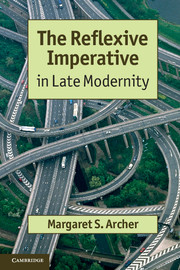Book contents
- Frontmatter
- Contents
- Figures
- Acknowledgements
- Introduction
- 1 A brief history of how reflexivity becomes imperative
- 2 The reflexive imperative versus habits and habitus
- 3 Reconceptualizing socialization as ‘relational reflexivity’
- 4 Communicative reflexivity and its decline
- 5 Autonomous reflexivity: the new spirit of social enterprise
- 6 Meta-reflexives: critics of market and state
- 7 Fractured reflexives: casualties of the reflexive imperative
- 8 Conclusion
- Methodological appendix
- Index
- References
4 - Communicative reflexivity and its decline
Published online by Cambridge University Press: 05 June 2012
- Frontmatter
- Contents
- Figures
- Acknowledgements
- Introduction
- 1 A brief history of how reflexivity becomes imperative
- 2 The reflexive imperative versus habits and habitus
- 3 Reconceptualizing socialization as ‘relational reflexivity’
- 4 Communicative reflexivity and its decline
- 5 Autonomous reflexivity: the new spirit of social enterprise
- 6 Meta-reflexives: critics of market and state
- 7 Fractured reflexives: casualties of the reflexive imperative
- 8 Conclusion
- Methodological appendix
- Index
- References
Summary
This chapter deals with the decline of ‘contextual continuity’ as nascent morphogenesis engages and with how the reflexive imperative correspondingly makes ‘communicative reflexivity’ more difficult to sustain. Why does this matter? It matters because in the past the communicatives were the only group whose responses to their social circumstances were socially reproductive in their effects and integrative in their consequences. Thus, this chapter emphasizes the shrinkage of ‘Bourdieu's people’ as the world Bourdieu knew changes. At the same time, it helps to account for modernity's growing deficit in social solidarity, or what some politicians have called the ‘broken society’.
The undergraduate subjects whose interviews will be examined, neither desire nor regularly obtain a rough parity of social position with their parents. Rather, what they seek is an intergenerational replication of their familial relationships, which nascent morphogenesis makes increasingly difficult to accomplish. In turn, their communicative reflexivity is of little assistance with the necessity of selection or with shaping their lives.
Why the reflexive imperative cannot be avoided
As these subjects encounter ‘contextual incongruity’ in everyday ways, the last thing they can rely upon in order to duplicate the source of the relational goods they received whilst growing up is ‘habitual action’. Instead, to achieve some approximation to replication – as the most that can be accomplished – involves strenuous work on the part of those concerned. This has to be deliberative in kind because of the novel paradox that reproduction now entails innovative action. What requires reflexive deliberation is the design of a modus vivendi whose satisfactions and sustainability are subjectively sufficient for the communicative reflexives and thus encourage them to continue to practise this as their dominant mode of reflexivity. As on a moving floor, you do not stay put by standing still and the simple solution of walking backwards is not an option.
- Type
- Chapter
- Information
- The Reflexive Imperative in Late Modernity , pp. 125 - 165Publisher: Cambridge University PressPrint publication year: 2012



